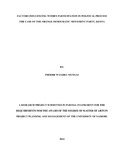| dc.description.abstract | The primary purpose of the study was to study factors influencing women participation in
political process in Orange Democratic Movement, Kenya.This was guided by the following
objectives: social factors, economicfactors, personal factors andpoliticalstructure in assess how
this factors influencewomen participation in political process in Orange Democratic Movement.
The study adopted a descriptive survey method. The target population of this study consists of
the 222members of Orange Democratic Movement at Nairobi Head office. The categories of
members are; the party leaders, the Strategist, women leaguesand think tanks of the party.A
sample of 143 respondents were picked using simple stratified random sampling techniques. On
the same basis of each constituency, the study population consisted of people who have been, or
are actively engaged in electoral politics before, during, or after elections.The results of the study
was both qualitative and quantitative. Quantitative data collected using a questionnaire were also
analyzed by the use of descriptive statistics using the Statistical Package for Social Sciences
(SPSS) and presented through percentages, means, standard deviations and frequencies. The
information was represented by use of tables. This was done by tallying up responses, computing
percentages of variations in response as well as describing and interpreting the data in line with
the study objectives through use of SPSS. The study may necessitate the call for the
empowerment of women by according them their due status, rights and responsibilities and
enabling them to participate actively in decision making activities. Women are a major force
behind people‟s participation in life and society today. Although, women have made great strides
forward in obtaining a vote and right to be elected to political offices in many countries, they
comprise less than 15 per cent of the Members of Parliament, and less than 5 per cent of heads of
state worldwide.Findings of the study indicates that women in political process are in the process
of attaining economic, social and political equality; to be well informed; to have access to basic
services and achieve maximum representation at all decision making levels. The study concludes
that when women stay in politics for long, and especially if they continue to be a minority in a
very masculine political climate, they may undergo a process of „masculinization‟, where they
tend to do things in the traditional, masculine and patriarchal ways. The study recommends
women need to be more purposeful about working on the personal factors that hinder them from
taking their rightful place in society. They need to work on issues of self-esteem and confidence
in relation to politics. | en_US |

